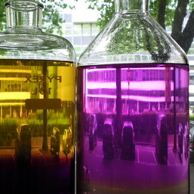Talk:Mod:NishMeisterG
Appearance
Q1
- “one is more kinetically stable” wrong term!
- Correct energies for 1, 2, 3 and 4. But your energies cannot be accurate to the 4th digit after the dot.
- Correct analysis of torsion and bend energy.
- Hydrogenation is actually under kinetic control (irreversible!), so looking at the product as we did is the wrong approach. But that’s what we have to start with.
Q2
- Correct energies all around.
- Can’t seem to get the energies reported from the Jmol structures included for chair 9 and 10. Ask for chem3D files.
- Correct analysis and reasonable explanation of hyperstable alkenes.
Q3
- Reasonable MOs, but not perfect as they’re not close to symmetrical.
- Good account for the reactivity using HOMO, and the s-p* interaction.
- Wrong vibrational frequencies for monohydrogenated 12, and the analysis afterward
- No analysis on bond lengths.
Q4
- What’s the reason for the Me group?
- Jmol of PM6 structure missing. Energies seem correct.
- “the conformations of A and B are lower in energy, and are more reactive than A' and B'.” If A and B are lower in energy then they’re less reactive. Think of the population distribution!
- Overall, you could have analyse much more the results, especially comparing the structure of A and C, B and D from PM6 calculation.
Mini project
- Not well defined question at all!
- “However the energies are still very similar indicating that the reaction would yield both products.”, again you need to discuss the thermodynamics vs kinetics argument here. *Is the reaction reversible?
- “The minimised energies for 11a and 12a, using Gaussian were -443147 kcal/mol and -443903 kcal/mol respectively.” Non-sensible numbers! We can only take the difference in energy here.
- Correct focus on the C in the 4-member ring. But where is the experimental data?
- Overall, you tried to do too much, and your data presentation did not help your case. Some discussion with us during the process would have helped.
